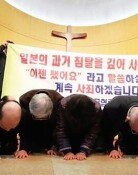Revised Capital Markets Act should be re-examined
Revised Capital Markets Act should be re-examined
Posted October. 17, 2019 07:30,
Updated October. 17, 2019 07:30
The Korea Enterprises Federation (KEF) submitted an opinion to the government Wednesday requesting the withdrawal of the government's revised bill to the Capital Markets Act. The current law prohibits shareholders’ intervention in company’s management if they hold five or more percent of a company’s shares and it is solely for the purpose of investment. However, the revision, which was announced by the government last month, would allow public pension fund providers such as National Pension Service (NPS) to change company rules if it is to improve the corporate governance structure, and to respond to irregularities committed by a company or a board member.
This means the NPS can express its opinions on management even though it is an “investment-only” shareholder. This new change is part of President Moon Jae-in’s efforts to enhance the so-called stewardship code of the NPS and keep the heads of conglomerates in check, which was one of Moon’s elections promises.
The NPS is the largest investor in South Korea managing 630 trillion won, 130 trillion won of which is invested in the domestic stock market. It is an investment-only shareholder of almost 300 listed companies. If implemented, the revised act would make it much easier for the pension provider to become involved in management.
What is more, some articles of the revision simply do not make sense. The revision says changing rules does not affect management, but this is nonsense. It also bucks the global trend in which more obligations are imposed on pension providers to report to the financial authorities.
The National Pension Service Investment Management has already tried intervening in management by using people’s retirement income. It objected to the late Hanjin Group Chairman Cho Yang-ho and SK Group Chairman Chey Tae-won being elected as directors in March, citing “undermining corporate values” and “encroaching on shareholder’s right.” If the government-controlled institution is given the power to influence the decisions of almost every major company or CEO, South Korea will face pension fund socialism.
People entrusted the government with the management of their money to prepare for their life in retirement, not for it to use the fund for punishing the companies that it does not approve. If the revision is truly to increase its long-term return on investment, the first thing that should change is the corporate governance structure of the NPS. Among 17 OECD member nations that allow public pension providers to have voting rights, South Korea is the only country where the head of the institution is appointed by the president. The revised Capital Markets Act does not even require discussions in the National Assembly to be adopted. The revised bill needs an all-out re-examination.







